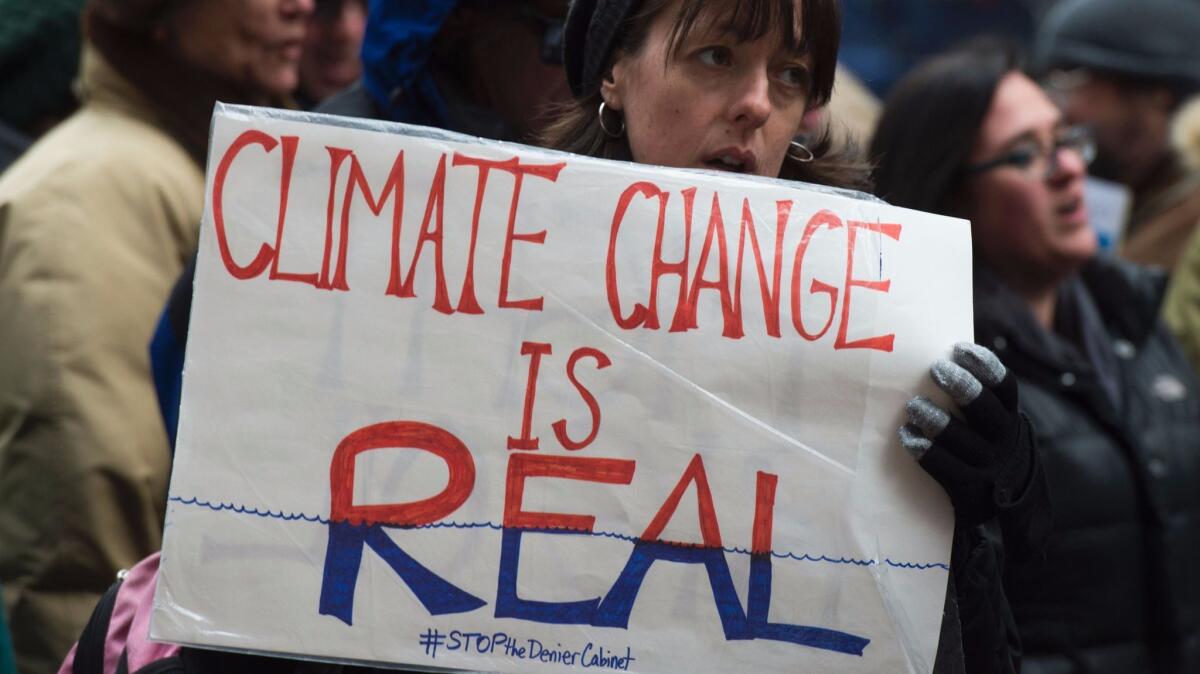It’s possible to ‘vaccinate’ Americans against fake news, experiment shows

An overwhelming 97% of scientists agree that climate change is real and that human activity is responsible. But only 27% of U.S. adults realize there is such widespread agreement, according to a recent Pew Research Center report.
The scientific consensus on climate change gets diluted as the public sorts between real news and fake news, facts and alternative facts. Misinformation can spread like a virus.
But just like a virus, it may be possible to “vaccinate” people against the effects of fake news, according to a new study in the journal Global Challenges.
“There’s phony arguments out there, but when you alert people to who’s putting them out and why, it may dampen their impact,” said Riley Dunlap, an environmental sociologist at Oklahoma State University who was not involved with the study.
In the study, a team of researchers led by University of Cambridge social psychologist Sander van der Linden tested this idea by giving people a simple warning about the existence of misinformation regarding climate change. They predicted that the warning would work by “pre-bunking” the false information that may come someone’s way (rather than debunking it afterward).
For their experiment, the researchers designed an online survey to gauge people’s attitudes toward climate change. In the process, some of the 2,000 respondents were exposed to fake news, and some were also exposed to a fake news “vaccine.” To disguise the researchers’ motives, subjects were told they would be randomly asked about one of 20 different topics in the news.
The researchers’ main interest was people’s estimates of the proportion of scientists that agreed man-made climate change exists. The subjects answered the same question at the beginning and end of the study so researchers could see how fake news and the vaccine shifted their views.
At the outset of the survey, the participants estimated that 70% of scientists, on average, were in agreement about man-made climate change.
During the survey, some people were shown a simple pie chart that said “97% of climate scientists have concluded that human-caused climate change is happening.” By the time these subjects got to the end of the survey, their estimate of the extent of the scientific consensus increased to 90%, on average — a gain of 20 percentage points.
Now for the fake news.
Some subjects who saw the pie chart were later shown a screenshot of the Oregon Global Warming Petition Project. Its website falsely claims that scientists are unsure whether man-made carbon dioxide emissions will warm the planet, leading to catastrophic effects. Exposure to this counter-information nearly canceled out the factual statement, the researchers found. Those subjects’ consensus estimate decreased by half a percentage point, from about 73.5% to 73%.
However, if the fake petition was “pre-bunked” with a vaccine, subjects held on to their higher estimation of a scientific consensus.
The study’s inoculation came in two forms: a general warning and a detailed takedown of the petition.
The general warning simply informed subjects that “some politically motivated groups” mislead the public into thinking there is disagreement among scientists about climate change.
The more potent version offered both the warning and specific refutations of the petition, including the fact that it contains faked signatures. (The late Charles Darwin and members of the Spice Girls are among the “signatories.”) It also noted that fewer than 1% of the signers had backgrounds in climate science.
The general vaccine increased participants’ perception of the scientific consensus by 6.5 percentage points. The detailed vaccine worked even better, providing a 13-percentage-point increase.
Whether subjects identified as Democrats, independents or Republicans, the inoculations resulted in an increase in the level of perceived scientific consensus. This suggests, as John Cook of the Global Change Institute at the University of Queensland told the Guardian, “nobody likes to be deceived” by fake news.
“This is not to say it’s a magic vaccine for everyone, but it seems to have some benefits,” Van der Linden said. “I’d imagine people who are deeply ideological … it won’t change their minds.”
The current study did not follow up on its subjects later to see whether the inoculation persisted over time, but other evidence suggests the benefits could last several years.
Joshua Compton, an expert in inoculation theory at Dartmouth College, pointed to a study that gave anti-smoking messages to young children and found that some effects lasted at least 20 months.
Extending the vaccine metaphor further, Van der Linden suggested that society could develop a “herd immunity” to fake news. After people have received the vaccine, he said, they could share their immunity with their friends by word of mouth — or social media.
The idea of psychological inoculation probably isn’t new to most Americans.
Dunlap said the climate change denial movement has borrowed from the playbook used by the tobacco industry in its efforts to undermine the scientific consensus that smoking causes lung cancer. Organized denial, which began in the 1980s, has been “remarkably successful” in spreading misinformation about the causes of climate change, Dunlap said.
Already, Van der Linden and Dunlap are seeing encouraging signs of psychological inoculations creeping into the public. After the election prompted an uproar over fake news, Facebook announced it would look into placing warning labels on misleading content.
Last summer, Sen. Sheldon Whitehouse, a Democrat from Rhode Island, began making speeches on the Senate floor with the goal of “pulling the curtain back” on the campaign against climate science. Dunlap said he sees Whitehouse, as well as news outlets like InsideClimate News and DeSmogBlog, as “inoculators” for the public.
“Some of the same folks that argued cigarette smoking is not harmful are the same people involved in climate denial,” he said. “If you can convince someone of that, then that’s serious inoculation. That’s not something that’s just going to wear off.”
Jack Zhou, an instructor at Duke University’s Nicholas School of the Environment who has studied climate change communication, said the findings opened new research questions. Among them: Could the inoculation also create a mobilizing effect on people’s attitudes toward climate action?
“Agreeing with [the idea that] climate change exists and agreeing that it’s caused by humans is not the same thing as saying we need to do something about it,” Zhou said.
If the goal is to get people to do something about climate change, mentioning the scientific consensus is a good place to start, Van der Linden said. His past research shows that improving the public’s perception of the scientific consensus translates to an increased belief that man-made climate change is both real and worrisome. That predicts increased support for public action.
“It’s a social norm that you’re conveying to people, and people pay attention to norms,” he said. Accepting the scientific consensus could act as “gateway belief.”
MORE IN SCIENCE
Wildfires, sea level rise, coral bleaching: Climate change is already here
Death rate from cancer down 20% since 1980, but clusters of high mortality remain
The last time the oceans got this warm, sea levels were 20 to 30 feet higher than they are today




